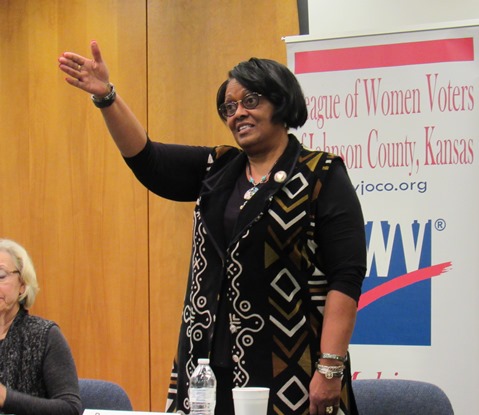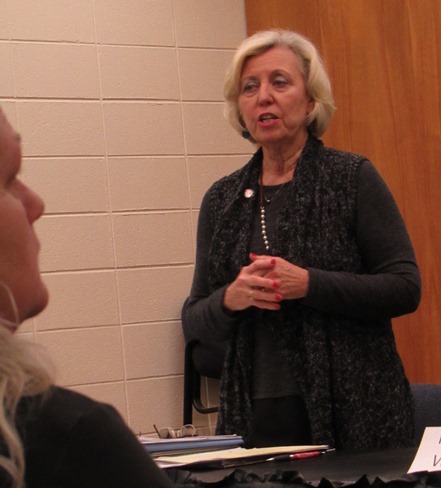


by Mary Rupert
Guns on campuses found opposition from local legislators and some of the audience at a weekend legislative forum in Kansas City, Kan.
While most of the discussion at the Feb. 11 legislative forum held at the Main Kansas City, Kan., Public Library focused on the budget and taxes (See “Moderate legislators may provide tax solutions,” https://wyandotteonline.com/column-moderate-legislators-may-provide-tax-solutions/) some of the other audience questions were about elections, KanCare expansion, and guns on campuses. The forum was sponsored by the League of Women Voters of Johnson County, the Kansas City, Kan., Public Library and the NAACP.
The three legislators speaking at the event, State Sen. Pat Pettey, D-6th Dist., State Rep. Valdenia Winn, D-34th Dist.; and State Rep. Pam Curtis, D-32nd Dist., were against allowing concealed carry on campus. A law will go into effect July 1 allowing concealed carry on campus unless the Legislature makes a change to it.
“As this issue of concealed carry becomes a reality, professors are not staying,” said Rep. Winn, a community college professor. Some top professors are leaving for that reason, and also because cuts have been made to public colleges. It’s more difficult to recruit professors, she added.
The cost of tuition has been going up the past five or six years as state aid has declined, Rep. Winn said. Some colleges are trying to sell off assets such as parking lots, almost like a “fire sale” to find resources, she said.
“This all rolls downhill,” she said. There are a number of factors contributing to some top professors wanting to leave.
“You can’t tell me it’s all about money. They’re just not willing to be here when some of these things occur,” Rep. Winn said.
Surveys taken at the community colleges and public universities have shown opposition to concealed carry on campus, she said.
Senate Bill 53 failed to come out of its committee, and a House hearing was held on a bill that would change the enactment date of concealed carry, Sen. Pettey said.
“All of these institutions are already in that planning process for what buildings will we have proper protection for,” Sen. Pettey, a retired teacher in the Turner district, said. That means a security guard and metal detector at any public entrance to the facility. For example, at Kansas City Kansas Community College or the University of Kansas, there is not just one door, there are many doors to many buildings. All the entrances would have to have security, resulting in very high costs as long as the building is open, she said. Some public buildings in recent years have had to remodel to limit all access to one entrance with a guard and metal detector.
Sen. Pettey asked if she had an office at a college, would she want to talk to a student about failing a class, especially if a student was not in a good state about it? Yet, office hours are often required.
Rep. Winn said taxpayers and tuition would have to pay for increased costs necessary for concealed carry on campus.
State legislators have previously decided to allow concealed carry at the Capitol. Rep. Winn estimated possibly 50 to 60 legislators may be carrying concealed weapons there currently. A legislator from Bonner Springs reportedly left a loaded gun under a table in a committee room one day.
Rep. Curtis said if there is an incident and two people are holding guns when law enforcement arrives, the officers may find it difficult to tell the bad guys from the good guys.
She said concealed carry also could be allowed July 1 at the University of Kansas Medical Center in Kansas City, Kan., unless the law is changed.
Reaction from local college
Andrica Wilcoxen, director of student activities at Kansas City Kansas Community College, said last week there was widespread opposition at KCKCC to concealed carry on campus. The student government was not happy that a bill did not pass that would have stopped concealed carry from going into effect at colleges.
“We don’t want guns on campus,” she said. Students were very much in agreement on that point, she said. Students believe there is a place to have guns, such as hunting or walking down the street, but not a college campus, she added. Some KCKCC student government leaders attended the hearings on it in Topeka.
The students heard testimony that if guns were allowed on campus, some students would be less likely to apply to Kansas schools, she said. Some faculty members or instructors would not look for positions on a campus able to have guns, or they would get a job at another location, she said.
She said the student government was inviting all the local legislators to a legislative town hall meeting from noon to 1:30 p.m. March 1 at KCKCC in the Upper Jewell Building on campus at 7250 State Ave.
It will be a meet-and-greet format, and students will have the opportunity to talk with legislators, she said. They will be able to ask about issues, but it will not be a debate, she added.
School finance
While school funding for K-12th grade was a big part of the budget and tax discussion at the forum Saturday, Sen. Pettey mentioned that a proposed budget would have cut school funding 5 percent across the board. That would have resulted in more than $6 million cut from the Kansas City, Kan., Public Schools, $1.5 million cut from the Turner school district, more than $600,000 cut from the Bonner Springs school district, and almost $500,000 cut from the Piper school district, she said.
These cuts would be from the last four months of this year’s budget, she added.
School leaders and residents from throughout Kansas voiced their opposition to this plan, it was scuttled and legislative leaders went back to work on another budget.
Rep. Winn said they’re waiting for the courts to rule on whether school funding is adequate, and also waiting to see how much revenue will be available.
KanCare expansion
There was not much discussion about KanCare expansion, although there was an audience question about it. Rep. Winn said the House legislators who were at the forum don’t serve on the committees that held hearings last week on KanCare expansion. Many supporters of KanCare expansion rallied at hearings last week and a committee vote might take place this week.
Sen. Pettey said while she wasn’t on the committees having hearings on KanCare expansion, one of her committees had hearings on legislation that would affect other changes to KanCare. The Kansas waiver request was rejected by the federal government. The governor opposes KanCare expansion.
Sen. Pettey said there is another bill in committee that will allow mothers on assistance to wait until one year, instead of three months, when they go back to work. Barriers to finding work have been finding child care and being able to afford child care, she said.
Elections
One question from the audience was whether Kansas can turn back giving Secretary of State Kris Kobach so much prosecutorial power to go after voter fraud. In the past, prosecuting people for voter fraud has been the responsibility of district attorneys in the counties in which it occurred.
Rep. Curtis said the House Elections Committee has heard from Kobach several times, and there’s not much hope that the committee would try to dial back the prosecutorial powers he was given to go after voter fraud. Some Democrats feel that these are mostly cases of forgetfulness, not intentional, on the part of the voters.
Rep. Curtis said she would like to find ways to challenge Kobach to look at measures to make voting more accessible. Rep. Curtis said there is a bill that passed this week that would require mail ballots that are postmarked on Election Day before 7 p.m. to be counted. Currently, she said some mail ballots are not counted if they don’t arrive at the election office in time, even if they were mailed on the Friday before the election.
Rep. Curtis said about two years ago, there were hearings on giving Kobach prosecutorial power. Then, a district attorney in Johnson County testified against it. He had looked into one case, where a couple in their 80s had mailed in ballots in Kansas, but then moved to Arkansas. They forgot they had already voted and voted in Arkansas, she said. The investigation determined there was no intent to commit voter fraud, as it was just forgetfulness, according to Rep. Curtis.
State Sen. David Haley, D-4th Dist., who was in the audience at the legislative forum Saturday, said afterward that the two-tiered voting system currently is in the 9th Circuit Court of Appeals, waiting for a decision. A law went into effect previously, and Kobach’s office was requiring proof of citizenship from voters in order for them to vote in all elections. Those voters who registered under the federal system without showing proof of citizenship were allowed to vote only in federal elections, under his system. In the last election, a court ruled that those federal voters had to be allowed to vote in all elections temporarily, until a court decision was handed down.
Senate Bill 37 would allow Kobach to continue with the two-tiered voting system, Sen. Haley said. Haley is on the Senate Ethics, Elections and Local Government Committee.
Sen. Haley said he was opposed to the two-tiered system in Senate Bill 37. He said the question was raised in committee about very close races, where one or two votes could decide a contest. The secretary of state’s office argued that a non-citizen who is registered but whose citizenship is not verified could decide a local election when they have no standing.
While he doesn’t support Senate Bill 37, Sen. Haley said he is looking at supporting ramping up penalties for illegal voting.
Rep. Winn encouraged people to call, write or visit their legislators with their concerns, but not to send form letters. Sen. Pettey said residents can make a difference. A new senator recently received 1,700 emails on the voter bill, making a difference in the new senator’s position, she said.
Future LWV, library and NAACP legislative forums are scheduled from 10 a.m. to 11:30 a.m. March 11 at the Bonner Springs City Library, and 10 a.m. to 11:30 a.m. April 8 at the West Wyandotte Library.
To see a column based on the budget and tax discussions with legislators, visit https://wyandotteonline.com/column-moderate-legislators-may-provide-tax-solutions/.

